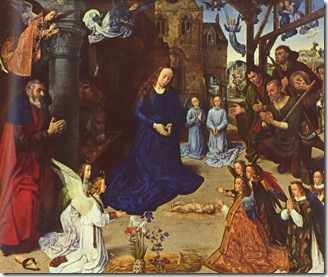My dad came from a family of seven kids. Six of them are still alive. Two of them didn't have kids - my Aunt Muggs became a nun and my Aunt Kathy never had any kids. But the other five had kids (me, my sisters and cousins) and now our generation has its own kids. And last year one of my cousins' daughters got married. I think there are about 45 of us if no one brings dates.
A long time ago we started the tradition of having mass together in the home. My dad and his brothers have strong connections to the Jesuits and there were priests who were friends of the family willing to come celebrate mass with us. Most people show up for mass, even those who have fallen away from religion. That's because it's low key and ... nice. And how can you go wrong with the story of the nativity?
There is so much about the story of the nativity that I like that has nothing to do with religion. For one thing, it is timeless. A pregnant young woman. Her husband is not the father of the child. But he is a good man who is committed to the relationship and willing to raise a child that is not his own. They are subject to a governmental bureaucracy that doesn't hesitate to put ordinary people to a great deal of trouble for purely administrative reasons. They encounter travel problems: too many people traveling all at the same time, leading to the ancient equivalent of being stuck in the airport. The wife goes into labor at the most inopportune time but delivers a beautiful, healthy child. And although they are far from home, the couple is surrounded by nice people - ordinary working people who take time out of their days to come by and offer their congratulations and assistance.
And from a spiritual sense, I like the message. Salvation doesn't come in the form of a powerful being who solves all your problems. It comes in the form of a helpless person who needs you to help solve his or her problems. What is the most helpless type of person in the world? A newborn baby. In my opinion, Joseph is the hero of this story because he epitomizes the message. He volunteers to become responsible for this little baby and his mother - two people in need. And like many people who spend their lives helping those in need, the spotlight often misses Joseph. He's not center stage - he's off to the side.
I always think it is a story that can be appreciated for what it is even if you don't believe in it as a religion. And during this Christmas season I honor all the people in the world who help the helpless - especially men who take care of children, their own and other people's.
Anyway, here is my favorite painting of the beautiful story of the nativity. The artist is Hugo van der Goes. The painting hangs in the Uffizi in Florence. The thing that I particularly like about this painting is that almost all the people in this painting have stylized faces and look vaguely similar -- except for Joseph and the shepherds. Joseph, as usual, is off to the side. Not in the spotlight. But Joseph just glows and, unlike Mary, he looks real. And the shepherds? Look at the shepherds. You can almost smell the sweat on them. They've come straight from work and after this strange interlude they will go back to work. See the looks on their faces. The curiosity. They've been told to come see something that will change their lives and what do they find? Not a great warrior. Not a liberator. Not Ed McMahon telling them they've won the lottery. But a little baby who couldn't possibly do anything for anybody. Here's a link to a larger version. Look at those faces.

It's a nice story. Mary Doria Russell said about her novel A Thread of Grace: "What I have written is not real, but I hope they will find it true." Whether or not we know or believe a story really happened, we can still find truth in it.